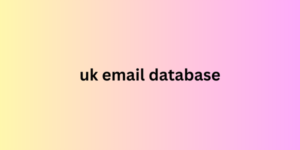Cases Our Students Neural networks
A little about Alexander
Alexander Yuryev, San Francisco
I am originally from Moscow. I have been developing uk email database my own projects and startups for almost ten years. Before that, I worked in the field of information security. I am an economist and financier by education.
No code, no problem
If I encounter a problem, I look for ways to solve it - I am even ready to dive into a new area. The most convenient way to do this is not by reading a bunch of materials on the Internet, but in the format of courses, where you are given a summary of information that it takes much longer to find on your own.
That's how I came across Zerocoder. At that time I had never worked with no-code or low-code tools, only hardcore ones - front, back, etc.
At

university, I learned that you can prototype and test product hypotheses much faster than I was used to.
This prompted me to study no-code platforms in more depth.
Study at x2 speed
I took the course about three years ago. I studied neural networks, launching mobile applications, working with web platforms.
The main disadvantage for me was the webinar format, as they are oriented towards different levels of preparation. During them, there is an opportunity to ask questions, but they seemed very simple to me as a techie. Therefore, I watched the webinars later, at x2 speed.
The plus is that the lessons are recorded.
You can calmly go about your business all week and watch several lessons at once at a time convenient for you.
Recipe for work
I usually work on several projects at the same time. One might be in the final stages, ideas for others are in development, and another one is at the prototyping stage. This part of the work has become much faster thanks to no-code platforms.
At first I limited myself to just them, but now I have found a more optimal option for myself.
For most of my projects, I choose a combination of a separate backend on zero-coding tools, and a separate frontend of the same format.
For example, I use Strapi or Directus to manage content and create APIs, and Supabase or Appwrite for the database and authentication. I do the frontend with React (or Vue.js, Next.js), connecting it to the API. The choice of tools, of course, depends on the specific task.
After testing the hypotheses, I hand over the prototype to my development team to transfer it to the classic technology stack.
It is difficult to create something new with zero coding alone. Its technologies are more suitable for creating something that is already on the market one way or another.
Zero coding has become an important step, facilitating the transition to the next most complex tools and their combinations.
Now I understand from the very beginning what I will use and for what purpose, what API methods will be, how to interact with them, what data models are needed . As a result, the result is as if a whole team of developers worked on it.
Aspirations
In terms of low-code, I am already in the process of constantly studying emerging platforms that allow me to further speed up or simplify certain processes, making them more user-friendly.
I study even those that came out just a couple of months ago, try to install them on my servers and use them.
In the startup sphere, ideas need to be tested as quickly as possible. Every day counts. I have to have time to create something in order to immediately test it on the market - will there be demand or not. Or first conduct marketing research, and then MVP may not be needed.
Now I have two successful projects, and a couple dozen more behind me - closed or not particularly successful yet.
Expanding capabilities
No one doubts the applicability of no-code or low-code platforms. They are easily used for what they were created for. But I would like to see non-standard options for their use.
People don't always understand what they can get. For example, before, no one knew that they would want a phone with only a screen. And now - I want to see the expansion of the capabilities of zero-coding tools.
Contact Alexander
https://www.linkedin.com/in/ayurev/
https://www.facebook.com/a.yurev *
*Facebook is a social network banned in the Russian Federation.